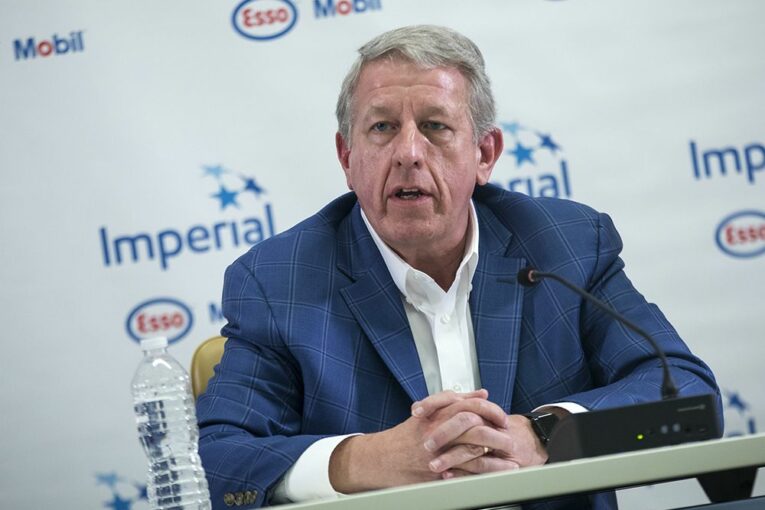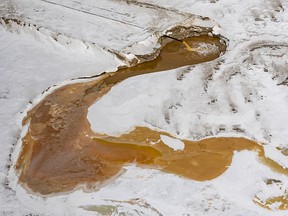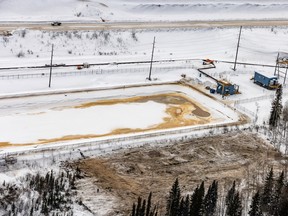
It didn’t take long for the tensions to rise Thursday after Imperial Oil CEO Brad Corson appeared at a parliamentary committee that’s holding hearings into a leak at the Kearl oilsands mine.
The first such moment happened just a few minutes in, after Corson delivered a land acknowledgment at the start of his testimony to the environment and sustainable development committee.
Even before the first question was asked, Fort McMurray-Cole Lake MP Laila Goodridge pointed out Imperial didn’t do so at a public meeting in Fort Chipewyan last month.
“That created a lot more frustration in my community, in the entire region,” said the Conservative MP, whose riding covers the oilsands area of northern Alberta.
“I hope, profoundly, that you have learned a lesson, that going up for a one-hour town hall and not starting with a land acknowledgment, and not starting with a prayer, is not how we do things in northeastern Alberta.”
It didn’t get any easier over the next two hours.
Goodridge soon raised concerns about drinking water safety that were sparked by two separate releases of industrial wastewater at the Kearl mine, which is operated by Imperial Oil — and the lack of communications the company had with local communities after the first incident in May 2022.
“There (were) weeks where there was just a vacuum of information,” she said.
“The fear was real, it was palpable.”
During the meeting, MPs from all parties took aim at the two releases of wastewater at the Kearl mine, including the initial seepage that was spotted last May, and why nearby Indigenous communities weren’t adequately notified about the issue for months.
“I just have one question: How do you sleep at night?” said Green party Leader Elizabeth May, in one rhetorical flourish.
And so it went on Parliament Hill.
“As expected, it was a bloodbath,” said Michael Solberg, a partner with New West Public Affairs, who provides government relations and strategic communications advice, and watched the hearing online.
“I think very little was put to bed here, other than we know that they’re sorry.”
That was a key message from the company, one it repeated several times.

Corson apologized for the lack of a land acknowledgment at last month’s meeting, and for the company’s mistakes in not properly communicating with Indigenous communities in the region.
“This communication breakdown has led to a significant amount of misinformation, which contributed to fear, confusion and anger in these communities. I deeply regret that this has happened.”
That was a start.
But it won’t quell the anger swirling around these issues.
“After hearing heart-wrenching testimony from community leaders on Monday, and vague promises from Imperial officials on Thursday, we are no closer to the truth,” Athabasca Chipewyan First Nation (ACFN) Chief Allan Adam said Friday in a statement.
While there weren’t many new revelations into the two incidents, it did mark the first time Imperial Oil’s CEO publicly answered questions about the matter, aside from comments made this week during Imperial’s investor day.
The first incident at Kearl was discovered last spring, after Imperial officials found discoloured industrial wastewater — containing arsenic, hydrocarbons and dissolved iron — seeped from the external tailings area at the mine.
It notified the province’s energy regulator and several local communities. Yet, it didn’t update them about the matter, nor contact community leaders.
In a separate incident, about 5.3-million litres of wastewater overflowed from a drainage pond at the mine in late January, which Corson said was caused by a combination of equipment problems and process failures.
The Alberta Energy Regulator issued an environmental protection order into the overflow on Feb. 6. It prompted the ACFN to advise its members to not eat any meat or plants harvested downstream from the oilsands site.
Imperial said its monitoring shows that released fluids did not affect drinking water or wildlife.
While the oilsands operator initially notified communities of the discoloured water, it didn’t want to go back to them until “we fully understood the situation and had a finalized plan,” Corson said.
That was a blunder, to say the least.
It also makes one wonder exactly when that moment would have arrived.
“We absolutely should have picked up the phone and spoken directly with the chiefs and the leadership,” Corson said.

More tough questions followed.
NDP MP Heather McPherson pointed out company officials met three times with an environmental committee involving ACFN last summer and fall, yet “the toxic seepage was never brought up . . . You’ve broken the trust that you have with those communities, so you’ll forgive all of us in this room for treating all of your testimony with a great degree of skepticism,” said the MP for Edmonton Strathcona.
“You were clearly trying to hide information from the Indigenous communities, isn’t that true?”
Not so, replied Corson.
“We have never been trying to hide any information. We were negligent in not sharing information proactively that we had,” he said.
“I cannot change what’s happened in the past. It was wrong and I’m very apologetic for it. I’m not happy with it. But I can change what we do going forward.”
Recommended from Editorial
-

Varcoe: A spill and unpaid tax bills weaken trust in Alberta oilpatch firms
-

Alberta Energy Regulator ignored law regarding Imperial Oil’s tailings pond leak: lawyer
-

Varcoe: As storms brew around the AER, it’s time for regulator to act
-

Indigenous communities call for regulatory overhaul after oilsands tailings leak
Solberg believes the company had to show up to face the difficult questions from MPs — and to apologize — but this won’t end the scrutiny facing the company.
And it will continue to come from all sides of the political aisles.
“There is multi-partisan opposition to what has occurred with Kearl,” he said.
“The story is not over yet.”
Chris Varcoe is a Calgary Herald columnist.
You can read more of the news on source
